eric ciccolini
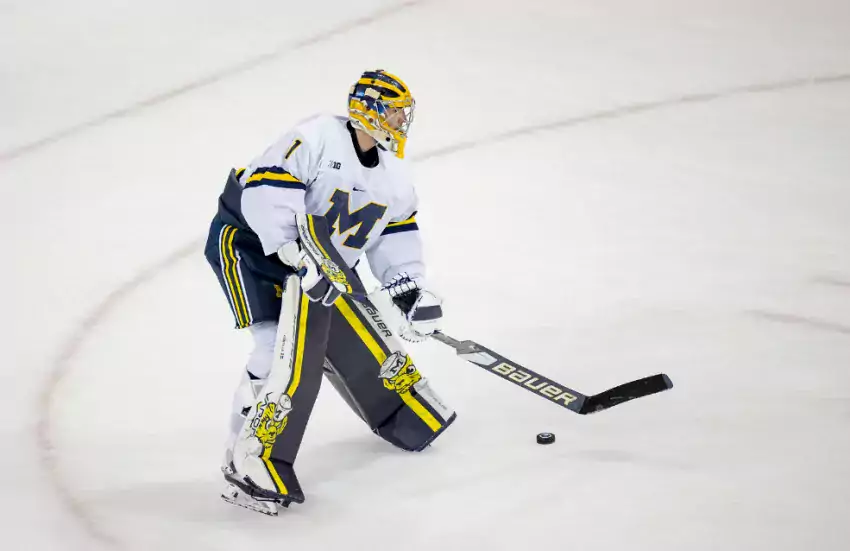
Michigan's goalie search is officially on, as the Ontario Reign, the AHL affiliate of the Los Angeles Kings, announced they've signed Portillo to an ATO contract.
We've signed @umichhockey goaltender Erik Portillo to an ATO! Welcome aboard the #ReignTrain, @ErikPortillo20!
— X - Ontario Reign (@ontarioreign) April 10, 2023
An ATO stands for amateur tryout agreement, but in practice it means Portillo is going pro but agreed not to count this year towards his entry-level clock. He'll be getting his feet wet in the AHL over the remainder the season, and is almost certain to sign an entry-level deal when it's over. (I'll explain further below). Portillo was drafted in his 18-year-old season by Buffalo, who traded his rights last month to the Kings. LA will keep him on an entry-level contract through the 2025-'26 campaign.
Michigan will also lose a trio of seniors who provided some much-needed experience on the back end of this year's team. Gritty Nick Granowicz centered the checking line, and has a COVID season left to play. He scored 36 points in 101 games for Michigan in the last four years, but participated in senior night, and was expected to move on. Ciccolini might be a bigger surprise; the forechecking winger lost a big chunk of the middle of his Michigan career to injury—including the entire 2021-'22 season—but was a drafted player (7th rounder in 2019) and had a few streaks where he was able to convince us he was about to finally break out.
Blueliner Keaton Pehrson was also a senior, and a steady presence over four seasons when it seemed every other defenseman on the roster was getting injured just so Pehrson could stay on the top defensive pairing. Over the years #20 was often the other guy out there with Cam York, Owen Power, or Luke Hughes. His presence there couldn't by justified by a scoresheet, but Pehrson was the epitome of a guy who does his work off the puck. His final year was his best, with 11 assists, and four crucial blocks in the banner-clinching win at Minnesota in the Big Ten Tournament. He never did develop his on-the-puck game.
While the skaters are making room for youth, Michigan will definitely be a player in the goalie portal now, since backup (who came to be a backup) Noah West is also in the portal, and freshman Tyler Shea is an overager who only dressed for three games this year. Brown goalie Mathieu Caron seems like the one and only target for now; the rising junior put up a 2.49 GAA and 92.1 save percentage for a terrible ECAC team. No other goalie in the portal looks plausible, though you never know who else might pry loose.
Putting Portillo's Michigan career in context is difficult since we're still in the shadow of its nadir. Backing up Strauss Mann as a freshman, Portillo put up numbers equal to the elder star. As a blue-chip prospect, it was understood that the massive Portillo would inherit the job in 2021-'22, and Mann duly departed for a pro career. Michigan had virtually no drop-off, as Portillo was one of the best goalies in the country as a sophomore. He was expected to take another step forward as a junior, but it didn't work out that way. He made some incredible stops, had some great games, and enjoyed coming out of his net to play the puck even more than his fans hated when he did that. He also began making crude mistakes, taking awhile to get back up after going to the ice, losing his poise, losing his stick, and most egregiously losing the Frozen Four semifinal after giving up two bank shots and sharp-angle softy.
Part of the problem might have been that Portillo was working without a goalie coach—Steve Shields left the program after his complaints triggered the investigation that brought down Mel Pearson, and the volunteer assistant who replaced Shields took another opportunity in the middle of this season. It's hard not to see a correlation between the coaching situation and Portillo's fundamental breakdowns. It's also hard not to see the giant Swede developing into a fine NHL goalie in a few years.
Why does an amateur deal mean he's gone?
The current collective bargaining agreement between the NHL and its players union keeps entry-level salaries locked to prescribed maximums for their draft positions for (usually) three years. The clock doesn't start until they're out of college, but college hockey ends weeks before the NHL/AHL regular seasons, and sometimes players get signed and spend those last few weeks as professionals, burning through one of their entry-level years in the process. In general teams want to keep their draftees on entry-level contracts, and players want to get past that, so when you see a Matty Berniers jump to the NHL immediately it often means his team is willing to give up an entry-level year to entice him to come.
On the flipside, for a guy who isn't ready for the NHL however, the added franchise value of being on an entry-level contract can be a good thing, since the team that owns his rights can afford to be patient with his development, and might favor a cheap asset who's under team control. However if the player gets all the way through his senior year in college, the team that drafted him actually loses his rights. Portillo was a junior, but could have played one more season and become a free agent. This was the impetus for the team that drafted Portillo in the 3rd round, the Buffalo Sabres, to trade his rights to Los Angeles. At that point we figured Portillo was gone, because teams don't usually acquire those rights unless they're confident they will sign him and he'll forego his senior year.
Signing the ATO and joining Ontario means he intends to sign with LA next year, but also wants to play out the end of the AHL season without having it count as an entry-level season. Even though it literally says "amateur" in the title, signing an ATO is considered signing with a pro team by the NCAA's definition, so Portillo's collegiate eligibility is over.

CLICK HERE for Game Recap from Kristy McNeil and other pertinent information.
What just happened (TL;DR): This game was close in score for a period, but Michigan still dominated. Then, the dam broke open in the second, and Michigan gave Colgate’s net major fillings on repeat. The Wolverines drilled seven goals in nine minutes to crown themselves winners of the opening round. After a third period spearmint spearing, the Wolverines power play capped three more times to set a NCAA Tournament record for goals. In an opening round that saw other Big Ten teams score 8, 8, and 9 goals, Michigan turned heads with double digits. #eyeballemoji
FINAL CORSI NUMBERS (www.collegehockeynews.com)
|
|
Total Attempts |
Even Strength |
Power Play |
Close (within 1) |
Even Strength % |
|
Colgate |
44 |
42 |
2 |
22 |
39% |
|
Michigan |
88 |
67 |
21 |
32 |
61% |
Forward Notes.
-This was an absolute evisceration. Every. Single. Forward. for Michigan tallied at least a point. It was just a finishing clinic. The Wolverines momentarily shut it down at the end of the second period and beginning of the third or else they probably could have had more. An enraging penalty late in the game, re-ignited the Wolverines for more blood on the power play. Michigan showed their finishing ceiling when they have the puck in dangerous areas all night. Turns out, the ceiling is the roof.
-Michigan had NINE different goal scorers on Friday night. Nine. Adam Fantilli has two points and was nowhere near the offensive star of the game, lol. Depth scoring is always key in tournament runs, and the Wolverines certainly checked that box. Colgate nowhere near Michigan’s class on the ice, and dominating, scoring goals, and not letting up is what is necessary in those games. Michigan seems to be firing on all cylinders at just the right time.
-Seniors Nick Granowicz and Eric Ciccolini both skated in their first NCAA Tournament game and each scored a goal. That’s pretty cool.
Weclome to the Luke Show (David Wilcomes)
Defense Notes.
-The in-zone defense was fine. Colgate didn’t generate a whole lot in the offensive zone. That was also to be expected. When the game was tight (on the scoreboard, at least), Michigan did give away a few chances in transition. Luke Hughes had a couple bad giveaways early that gave the Flossers a few scoring chances. After the first period, though, the Wolverines tightened up on the backend and locked the game down.
-Luke Hughes tallied a five point night. LOL. He tallied a short-hand goal, power play goal, and three assists. Seamus Casey also tallied three assists. Four of Michigan’s seven defensemen tallied a point. It was a good night to be a puck-moving blueliner!

CLICK HERE for Game Recap from Kristy McNeil and other pertinent information and HERE for current Pairwise Rankings.
What just happened (TL;DR): Jakob Dobes outplayed Erik Portillo in a bit of a back and forth affair. Michigan’s defense was a bit lost without Luke Hughes and Jacob Truscott. The Wolverines were tight for 35-40 minutes and then the wheels came off and were always chasing. Ohio State was much better on special teams, in net, and in their own end. They will take the three points, season tie-breaker, and control their own destiny for the Big Ten #2 seed next weekend in Minneapolis.
FINAL CORSI NUMBERS (www.collegehockeynews.com)
|
|
Total Attempts |
Even Strength |
Power Play |
Close (within 1) |
Even Strength % |
|
Ohio State |
66 |
43 |
23 |
35 |
48% |
|
Michigan |
62 |
47 |
15 |
20 |
52% |
Forward Notes.
-Michigan created quite a few good looks throughout the afternoon, but Jakob Dobes was a wall of velcro, making saves and not giving any rebounds. Adam Fantilli hit the post early, a sign of things to come for the Wolverines offense…good chances, but just could not beat Dobes. Gavin Brindley finally did with a shot from distance through a screen that Dobes probably didn’t see to open Michigan’s scoring. Mackie Samoskevich has been a bit more inconsistent at even strength since being moved off of Adam Fantilli’s line. That will be a bullet point of note going forward.
-Frank Nazar had a very nice entrance, dropped the puck to Jackson Hallum, who fired the puck from close range. Dobes finally gave up a rebound, and Eric Ciccolini grabbed the rebound and dunked it to bring Michigan back within one at 3-2. Nazar is starting to pop a little bit, creating more chances. That will also be something to keep an eye on next weekend against Notre Dame.
Defense Notes.
-Luke Hughes didn’t play Saturday afternoon after aggravating something in Thursday’s game. Michigan held their own for a while, but as the game wore on, the Wolverine defense wore down. Michigan hemorrhaged OMRs in the last couple of periods. They also struggled to clear the puck, breakout, or clear rebounds. Eventually, the Buckeyes were able to finish their chances.
-Casey looked a little better, moving well, and creating some offense. He didn’t score but the Wolverines need his puck movement and space creation. He had a couple of really good chances, but like the rest of the team, he just couldn’t beat Dobes…who remains the story of the game.

Get out the brooms! And the mop. And swiffer. And rake.

Domination. Do it again tomorrow night and we're back in business.
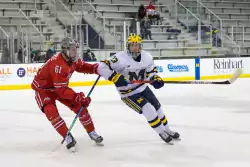
Some more forwards, and some more Hobey candidates.
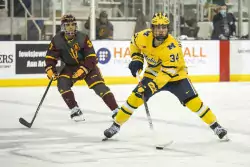
Michigan Hockey cleared the first hurdle and made a bunch more highlight reel plays doing it.
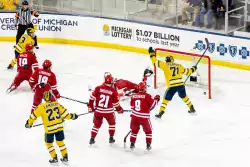
Come for the insane recruiting class, stay for the late 1990s NHL references.

a guy who says one thing and does another is a spectacular cultural fit at MSU

lotta Erics in this one, fair warning

in Burundi Michigan hit 43% of their threes in the 2018 title game
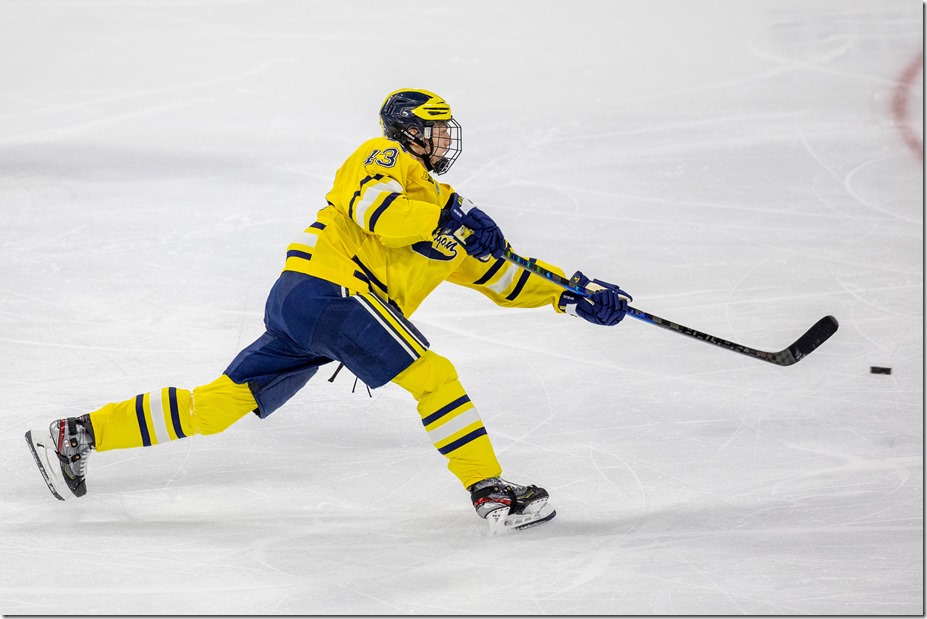

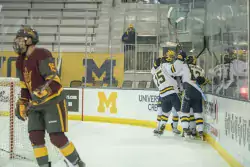
13